Just over a month ago, we announced the Shopify App Challenge: Commerce and COVID-19. We challenged app developers to build apps that address the realities and challenges of this new world, to help merchants right now.
Over the month that followed, we saw an incredible outpouring of energy as developers joined us in workshops, webinars, and forums, to quickly learn and build inventive new ways to help merchants persevere.
To say that we were impressed with the quality of submissions received would be an understatement—every day, our internal Slack channels lit up with excitement over the innovation and creativity we saw in incoming submissions.

Our judges rolled up their sleeves and got to work. Chief Technology Officer Jean-Michel Lemieux, Chief Operating Officer Harley Finkelstein, UX Director Amy Thibodeau, VP and GM of Platform Brandon Chu, and Senior Strategic Partnerships Lead Fatima Yusuf went through submissions, narrowing down the apps, looking for the most impactful and inspiring solutions.
Today, we’re excited to announce the 10 winners of the Shopify App Challenge! These apps are not yet all live in the Shopify App Store, but our winners will be assigned mentors to help them get their solutions published and ready for merchant use as soon as possible. We can’t wait.
You can also check out the impressive honorable mentions.
First place winners
The apps we chose as first place winners all demonstrate a real understanding of the difficulties facing business owners today, as they try to navigate a COVID-19 world. Drawing from their own personal experiences, these developers have built apps that help small business owners pivot in a changing marketplace.
Appointments and Bookings by Tilo Mitra
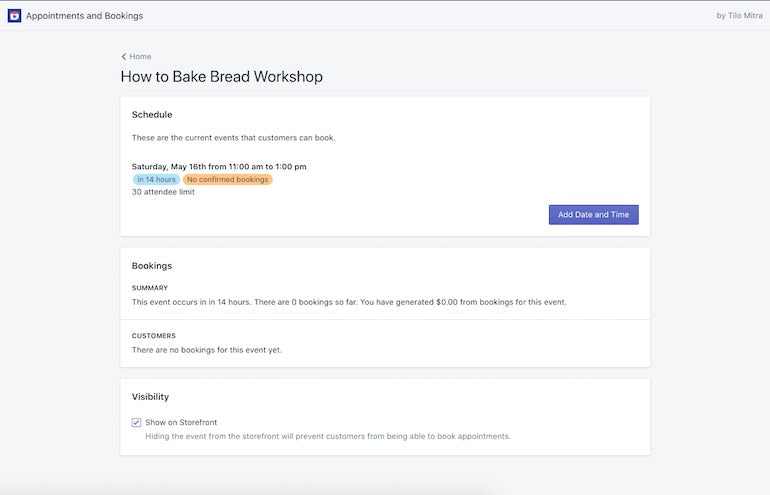
When the COVID-19 pandemic hit, thousands of entrepreneurs found themselves suddenly unable to interact with their customer base. Many, like instructors, chefs, and trainers, turned to virtual events to continue bringing in revenue.
Tilo Mitra, the developer of the app Appointments and Bookings, saw his own mom make that pivot.
“She was offering yoga classes at the community center for seniors,” Tilo explains in his app submission. “Now she hosts these classes on Zoom—but she is unable to take payments and organize her event schedule digitally.”
That’s what inspired Tilo to build Appointments and Bookings, an app that allows merchants to accept bookings and appointments on Shopify. Merchants can choose a product and create events for it with no theming or custom coding required. Customers can view available events on the storefront, book one, and check out. Customers are kept up to date on event changes with automatic email notifications. The app is theme agnostic, and integrates with Google Calendar. It supports Google Hangout and Zoom links, group bookings, and attendee limits.
Tilo’s app shows a deep understanding of the challenges entrepreneurs—especially those who offer services and classes—are now facing. By building an app that helps these entrepreneurs move their business online in this way, Tilo is helping them navigate a new virtual reality.
"Tilo’s app shows a deep understanding of the challenges entrepreneurs—especially those who offer services and classes—are now facing."
Droptimize by Amanda Connolly, Sean Peters, Tarun Singhal, and Tyler Post
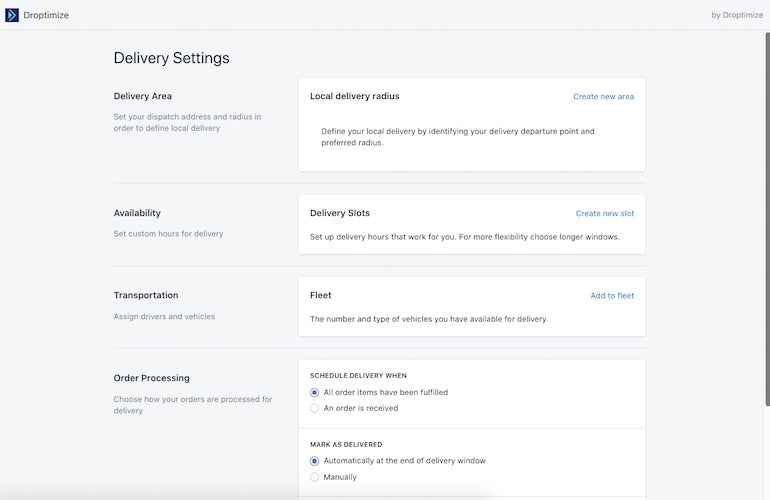
In the weeks following the COVID-19 shutdowns in her city, Amanda Connolly started noticing that small business owners—including her own aunt—were pivoting to local delivery, but were having trouble figuring out the best delivery routes and schedules.
When Amanda heard of the Shopify App Challenge, she got in touch with her former coworkers and best friends, Sean Peters, Tarun Singhal, and Tyler Post, to build an app to help.
The team was brand-new to Shopify, but quickly gathered the info they needed about the ecosystem, learned the tech stack, familiarized themselves with the design system, and got to work.
“Sean helped turn these pain points into a product roadmap, and explored and defined the opportunity area,” the team’s submission explains. “With a concept and some high-fi mockups, Tarun and Tyler joined forces on the development of the app, leveraging Amanda’s designs and Sean’s shiny Trello board.”
Their solution? Droptimize, an app that allows merchants offering local delivery the ability to optimize their delivery routes. Droptimize factors in dispatch location, delivery radius, minimum order size, product type, variable delivery windows, and number of vehicles into the optimization engine, and creates the most efficient delivery schedule.
The goal of Droptimize is to make delivery easier by allowing merchants to deliver items locally themselves. It also enables merchants to retain employees by moving them into fulfillment and delivery, and extends delivery options beyond traditional delivery networks.
"The goal of Droptimize is to make delivery easier by allowing merchants to deliver items locally themselves."
The Droptimize team has demonstrated their understanding of a changing commerce landscape, the challenges faced by small business owners, and the opportunities that extend beyond COVID-19.
You might also like: How to Get More App Downloads in the Shopify App Store.
ToGo Hero by Kyle Boss, Matt Chan, and Grace Kang
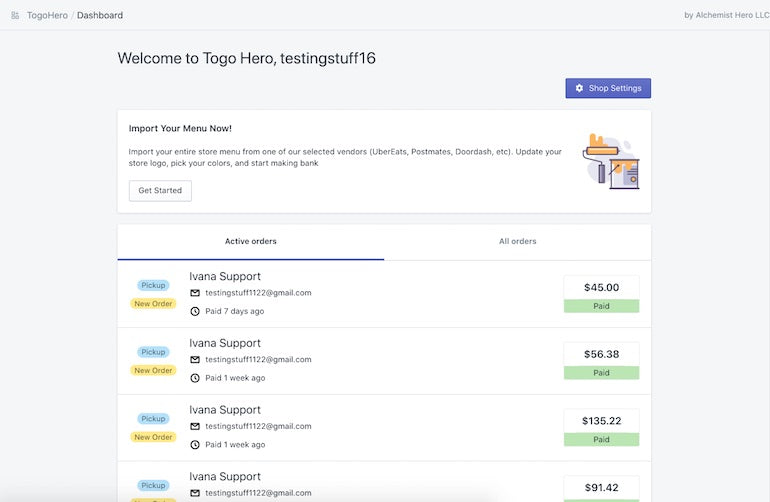
Third-party delivery services for restaurants have brought extreme convenience to customers ordering takeout. While the team of Kyle Boss, Matt Chan, and Grace Kang all agree the appeal of these services is obvious, they also flag that these services come at a cost to the merchant: a commission fee that can cost upwards of 30 percent on each order. They wanted to fix that.
“Consumers cite ‘supporting the local community’ as the most important factor when selecting a carryout or delivery provider during this pandemic,” explains the team’s submission. “With proper awareness of the business dynamics at play with third-party takeout apps, consumers would be more than happy to patronize restaurants directly.”
Enter their app, ToGo Hero.
ToGo Hero lets restaurant owners set up a powerful online ordering system on Shopify in under five minutes. The app allows owners to import their UberEats or third-party menu URL, save time with a fully functional and mobile-friendly online menu, and support delivery and curbside pickup. It’s a commission-free way of offering all the convenience of third-party food delivery services directly to customers.
"ToGo Hero lets restaurant owners set up a powerful online ordering system on Shopify in under five minutes."
With the explosion in restaurants pivoting to ecommerce to stay afloat, the ToGo Hero team has built a tool that supports these business owners directly. By allowing them the same convenience customers are used to, without a commission fee, they’re helping restaurants survive a challenging new world.
Second place winners
The impressiveness of submissions to the Shopify App Challenge continues. The apps we’ve selected as second place winners all demonstrate an understanding of the different niches that merchants operate in, and an ingenuity in solving the challenges they face.
Alpaca by Alumworks Technology Inc.
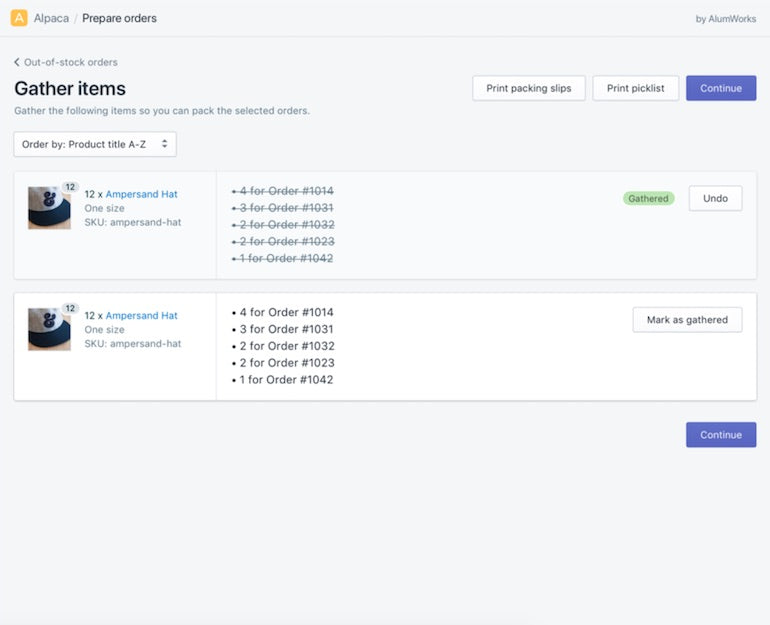
Fulfillment options like curbside pickup and local delivery have grown exponentially since the outbreak of COVID-19. And while these options are vital for merchants to continue operating in today’s world, the founders of Alumworks Technology both recognized that these additional options are further complicating already-complex fulfillment processes for merchants.
Enter their app, Alpaca.
Alpaca is a fulfillment dashboard that empowers merchants with specific fulfillment workflows for all order types, such as pickup and delivery. It gives merchants an overview of orders that need to be fulfilled, and provides a packing flow that makes the process easier by showing picklists and order summaries in bulk.
"Alpaca is a fulfillment dashboard that empowers merchants with specific fulfillment workflows for all order types, such as pickup and delivery."
Once orders are ready to be fulfilled, merchants get contextualized views based on the fulfillment type. Customers can select pickup times, which can be limited to help enforce social distancing. Pickup orders are then sorted chronologically on a timeline view for the merchant, who can mark the order as picked up once the customer has dropped by. Delivery orders are shown on a map view, and merchants can even generate an optimized delivery route with a single click. This route can then be sent to delivery drivers via email or SMS.
Using Alpaca, the fulfillment process is now easier for merchants, even with the added complexity of curbside pickup and local delivery.
You might also like: User Testing Your Shopify App: Public App Use Cases You Should Test.
Caazam! by Niv Hanigal and Shai Ben-Tovim
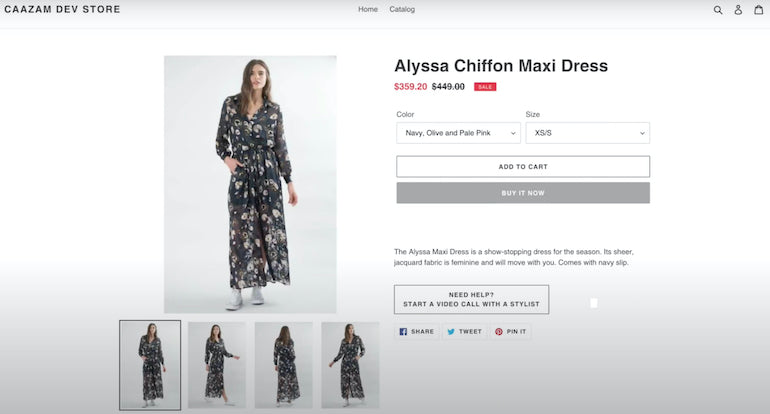
With the realities of COVID-19, the day-to-day routine of retail businesses is forever changed. Omnichannel commerce will become the norm, which presents new challenges for shoppers and merchants alike. One of those challenges is replicating the in-store experience remotely.
It’s a challenge Niv Hanigal and Shai Ben-Tovim are tackling with their app Caazam!
Caazam! is a personalized video shopping app that connects the store associate with the shopper, via a video call. With Caazam!, customers can view a product and start a video call with an associate.
On the other end, the associate will see the full profile of that particular customer, including purchase history, recommendations, and more—all of which can help the associate provide a truly personalized experience for the shopper.
Niv and Shai have not only built an app that helps merchants now, but that also provides a tool for retailers to navigate the future of commerce in a post-COVID-19 world.
"Niv and Shai have not only built an app that helps merchants now, but that also provides a tool for retailers to navigate the future of commerce in a post-COVID-19 world."
Verdn by Rory McMeekin and Christopher Mjelde
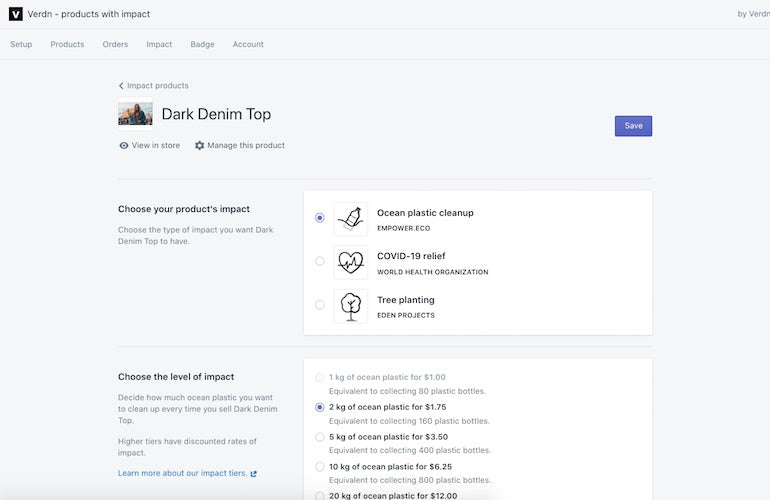
Consumers are more and more interested in spending their money on brands that have a positive impact on the world. Rory McMeekin and Christopher Mjelde saw this trend emerging. While there were already ways to add charitable causes to a merchant’s business, something was missing: a way for shoppers to track the scale of their impact.
That’s just what Verdn, Rory and Chris’s app, does.
Verdn allows merchants to attach a curated selection of social and environmental causes to the products they sell, including ocean plastic cleanup, reforestation, and COVID-19 relief. Merchants can choose which cause to support, and add a badge to products that help that particular cause. They can also adjust the prices of products through the app, to recoup the impact cost.
"Verdn allows merchants to attach a curated selection of social and environmental causes to the products they sell, including ocean plastic cleanup, reforestation, and COVID-19 relief."
But the app goes above and beyond your typical charitable donation. When buyers purchase an item tied to a cause, they’re invited into Verdn’s third-party dashboard, where they can view the different products they’ve purchased, the causes those products have supported, and a timeline of how their donation is being used by each cause. Not only is it helpful for buyers to see where their money goes, but it also helps brands reconnect and re-engage with their customers.
Verdn helps merchants give back during a trying time, and provides another channel to continue the conversation with their customers.
Third place winners
Our third place winners have all built solutions that address problems facing merchants in their various verticals. These innovative apps all help merchants optimize their operations in a challenging time.
Freshly by Lichen Zhang and Basil Khan
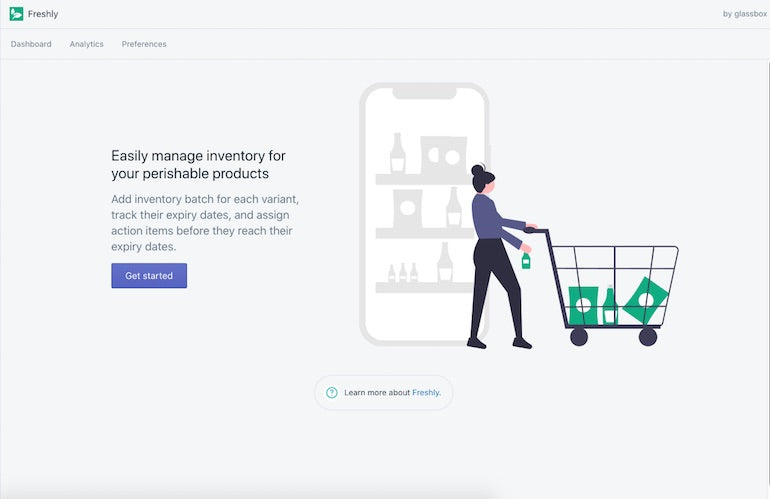
The food and beverage industry has been hard hit by the COVID-19 pandemic. As a result, the number of food and beverage companies pivoting to ecommerce has exploded. Included in that are grocery stores, which are moving online en masse as shopping in-person gets harder.
But managing perishables in an ecommerce setting can be hard, especially when it comes to inventory tracking. That’s the challenge Lichen Zhang and Basil Khan set out to address with their app, Freshly.
Freshly is an inventory and expiry date manager for perishable products. It provides inventory batch tracking with expiry dates, and automates how expiring inventory gets moved so that merchants can sell it before it’s spoiled.
With Freshly, merchants can continuously discount perishable items, create product bundles, and forecast demand so they can optimize their inventory to increase profit. Since the onus is on merchants to ensure their products aren’t spoiled, they can use Freshly to ensure they’re selling products in the right order.
Freshly helps food and beverage merchants avoid spoiled inventory, while increasing profit.
"With Freshly, merchants can continuously discount perishable items, create product bundles, and forecast demand so they can optimize their inventory to increase profit."
You might also like: 10 Things we Learned Building Our First Shopify App.
Product Messaging by Scott Jacobson
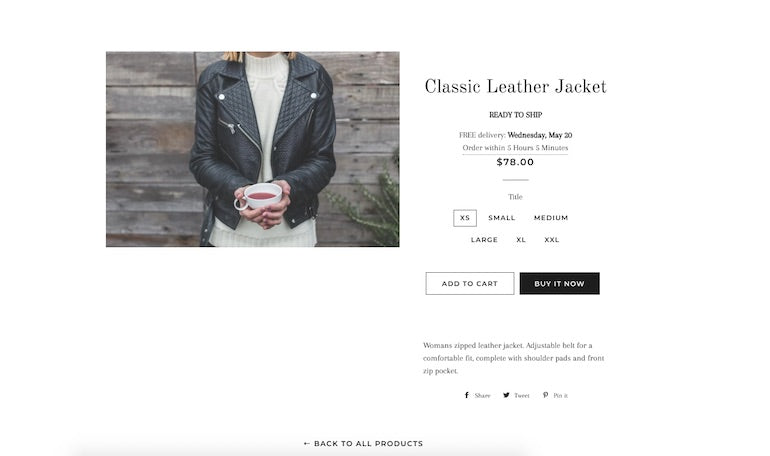
When shopping online, one of the most pressing questions buyers have is when they’ll receive their item. Merchants can add labels to their products to provide some clarity on delivery times, but these can be difficult to maintain and keep accurate.
Scott Jacobson set out to solve this problem with his app, Product Messaging. This app allows merchants to show custom dynamic messages on product pages, like expected delivery times, time remaining to shipment cutoff, and inventory level-based information. These messages change dynamically based on the merchant’s inventory level, which means less upkeep on the merchant’s end.
"This app allows merchants to show custom dynamic messages on product pages, like expected delivery times, time remaining to shipment cutoff, and inventory level-based information."
The messages are also highly customizable with HTML and CSS, and can be placed anywhere on the page, meaning buyers will see messages at the critical stage of their shopping journey. Armed with a better idea of when they’ll receive their item, the shoppers are more likely to convert, and less likely to contact customer support.
Building an app that shows dynamic messages to shoppers helps merchants increase conversion rates, and provides more confidence around shipping times.
Recipes by BentoSMB
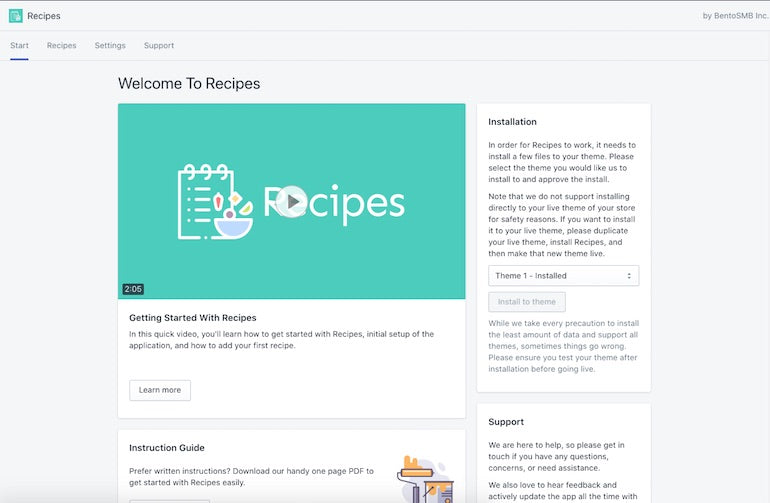
With so much of the world staying home, searches on Google for recipes of all kinds have skyrocketed. For merchants who feature recipes on their store, standing out on the search results page—and, therefore, driving more traffic to their website—is heavily dependent on having strong SEO.
That’s where Recipes comes in, an app built by BentoSMB. It’s an easier way for merchants to add structured, mobile-optimized, and SEO-friendly recipes to their articles and pages. Merchants create recipes in the app admin, then simply insert a shortcode to their post, which populates the full recipe on their site.
"It’s an easier way for merchants to add structured, mobile-optimized, and SEO-friendly recipes to their articles and pages."
Visitors to the merchant’s site will see the recipe, complete with options for printing and sharing. The recipes are easy to view, navigate, and use on all devices. They include tab switching between ingredients and instructions, images, nutrition label generation, and more.
By making it easier for merchants to publish SEO-friendly and user-friendly recipes, BentoSMB has built an app that can drive more traffic, engagement, and conversions for merchants.
Zip Code Check & Waiting List by Avocados Lab
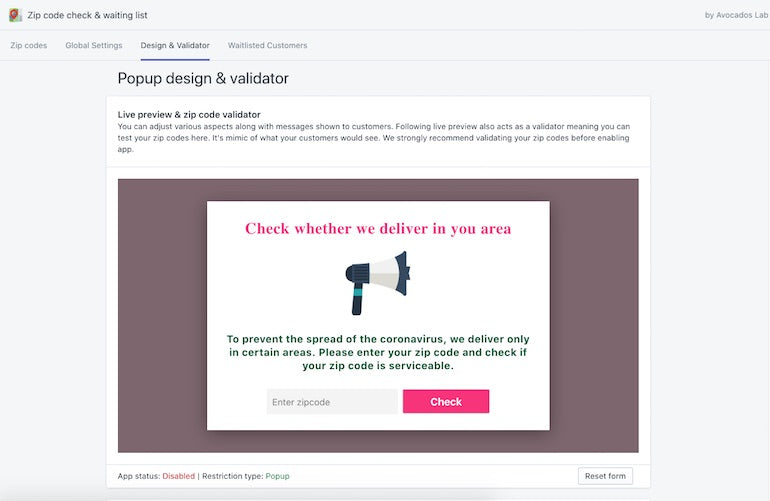
For merchants offering delivery, it can be difficult to determine if a buyer lives in a serviceable area or not. Additionally, if a buyer orders something but they don’t live within the delivery radius, it can cause a lot of support debt for the merchant.
Avocados Lab set out to solve this problem with their Zip Code Check & Waiting List app. With this app, merchants can add a popup or homepage section that asks buyers to enter their zip code and validate that delivery is available in their region. If it isn’t, the app also allows buyers to join a waitlist via email, so they can be notified if the delivery area expands.
"With this app, merchants can add a popup or homepage section that asks buyers to enter their zip code and validate that delivery is available in their region."
Merchants can configure the app to match the branding and overall look of their store. Helping merchants communicate their delivery radius to customers enables them to focus their time on the work that matters most.
Supporting merchants through innovation
Every app we chose as a winner for the Shopify App Challenge is a creative and unique solution to the obstacles merchants and small business owners face as a result of COVID-19. By building these solutions, developers are helping to keep small businesses alive and thriving.
We’re beyond impressed with the quality and inventiveness of these apps. A big congratulations to all the winners, and thank you to everyone who participated in the Shopify App Challenge: Commerce and COVID-19! Be sure to check out the honorable mentions as well.








